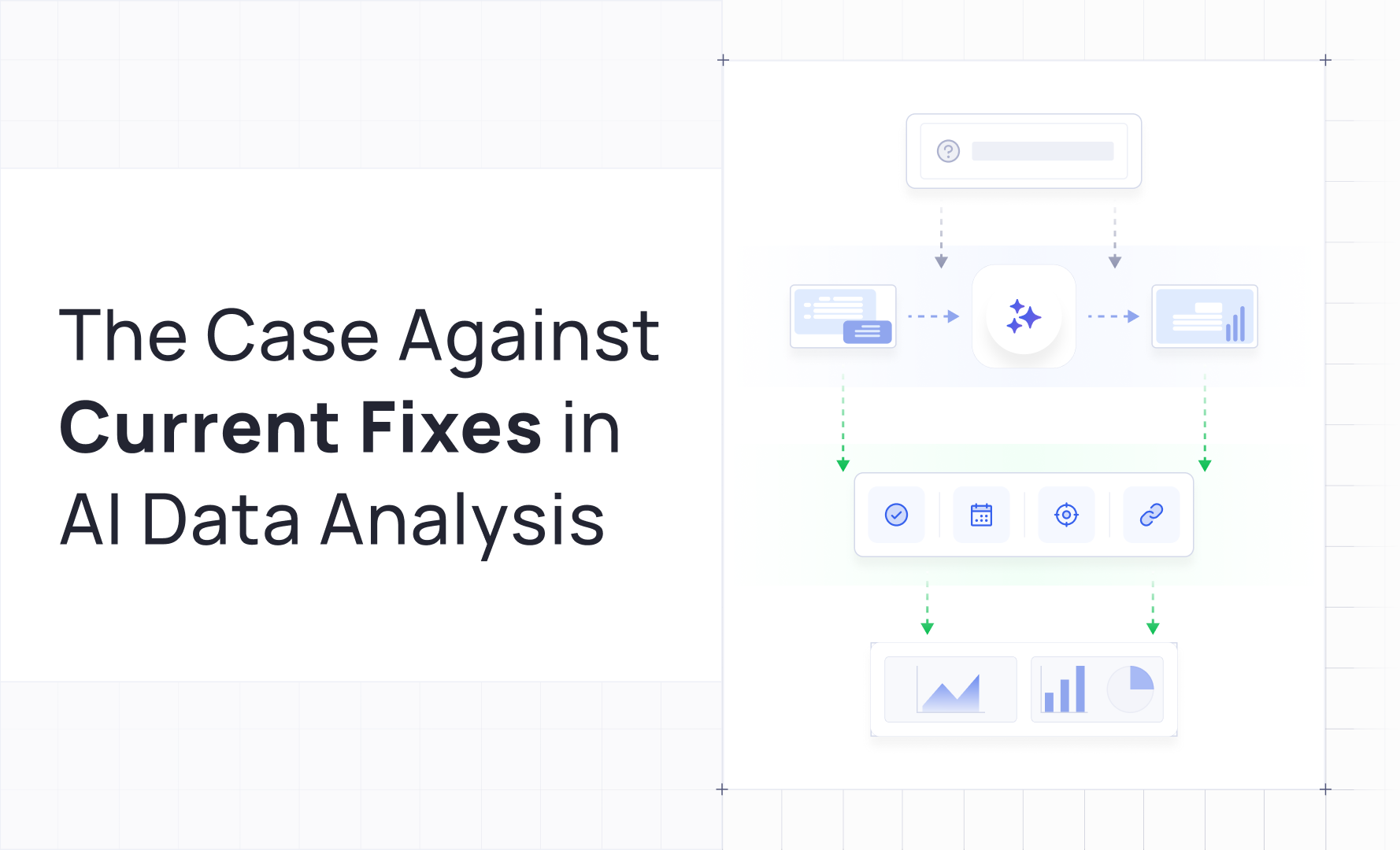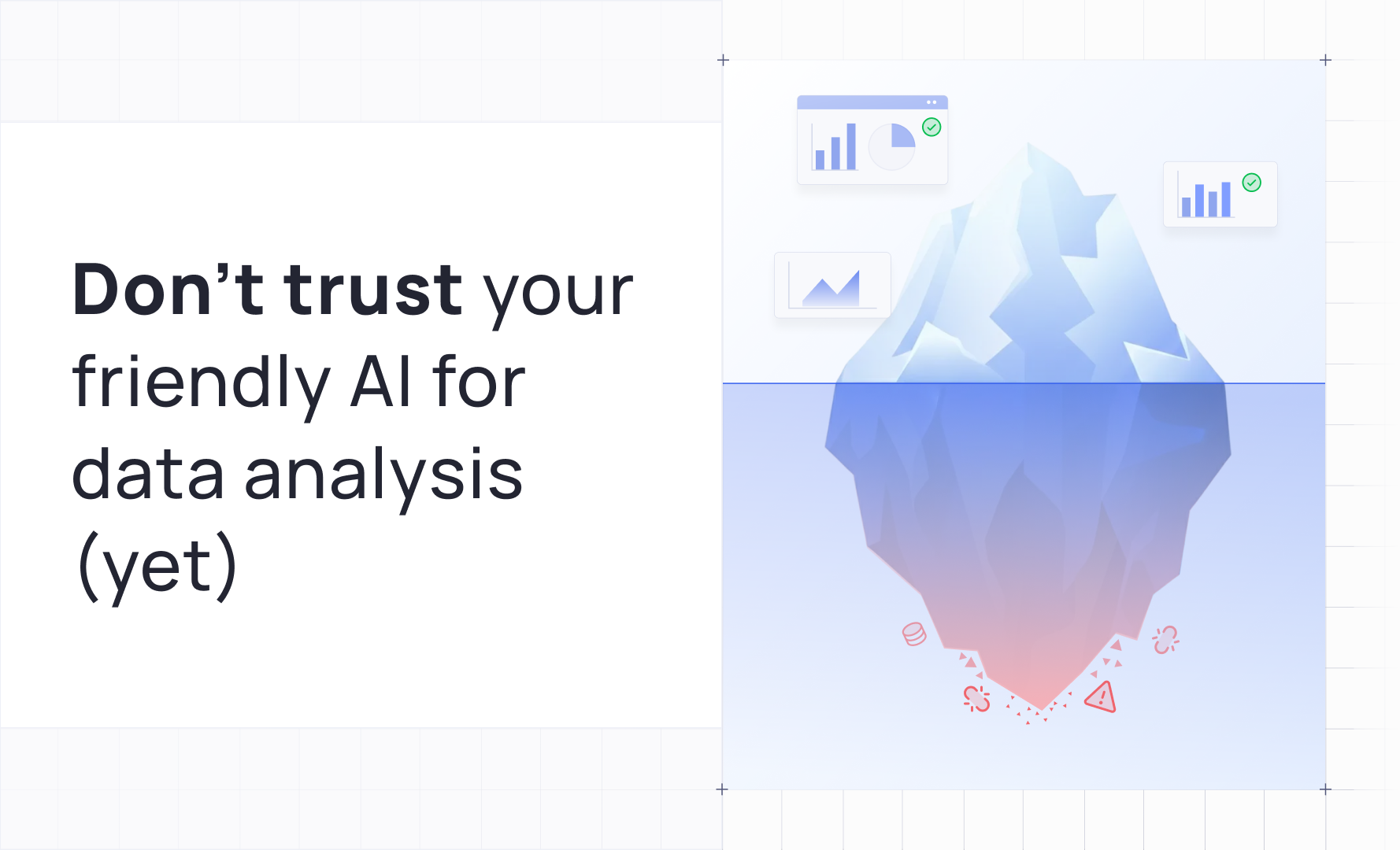Every marketer has lived this moment:
"Our paid-to-PQL conversion rate dropped 22% this quarter." Your CEO wants answers by EOD.
Should be simple, right? After all, you've invested in the full stack – CRM, product analytics, marketing automation... Yet somehow, none of these tools can tell you what's really going on.
So your team needs to pull back their sleeves:
- They spend hours matching ad platform data with product signups
- Everyone builds their own spreadsheet trying to track which ad campaigns lead to active product usage
- You discover underperforming ad campaigns only after burning through budget
- The data can't tell you if website demos convert better than direct product signups
- No one knows if higher ad spend actually results in better qualified PQLs
The problem?
Every vendor is shoving AI into their marketing tools. "AI-powered insights!" But another dashboard with AI charts or a bolt-on machine learning model won't fix this.
It's like putting a Tesla computer in a '99 Honda Civic(!!!) – you're still working with disconnected data sources, just with fancier visualizations. Your ad platform's AI can't see your full funnel, and your analytics can't understand true campaign performance.
You're basically playing data Jenga with very expensive tools.
Marketing teams need a fundamentally different approach: AI that can actually connect and understand your entire customer journey.
Think of it as an always-on analyst who can instantly answer your toughest questions: which campaigns drive real business outcomes, why certain leads convert better than others, and where you're losing opportunities – all in real-time, across your entire marketing stack.
The companies that get this are pulling ahead.
McKinsey found organizations with AI-native solutions see 5-15% higher marketing ROI than those using traditional analytics. That gap isn't staying static – it compounds every quarter as AI-native teams optimize faster and spot opportunities sooner.
Let's talk about how marketing teams are moving beyond dashboards to transform how they make decisions.
The Three Stages of Marketing Intelligence
Most marketing teams are stuck in what McKinsey calls the "Getting Started" phase – using disconnected AI features across their stack.

You know the drill: your CRM has "AI forecasting," your ad platforms have "smart bidding," and your old analytics tools promise "AI-powered insights." Yet you're still struggling to answer basic questions about performance.
Some teams have leveled up to "Customized Solutions." They've invested in data warehouses, built connections between their marketing tools, and maybe even have a BI team creating custom dashboards. Their AI models are trained on their specific data, so they're getting better insights.
But here's the catch – they're still in reactive mode. Sure, these solutions can tell you exactly why last month's campaign underperformed, but by then, the budget's already spent. Better insights, same old timing problem.
But the teams winning in 2025? They've moved to what McKinsey calls "Transformative AI." Here's what that actually looks like:
- Instead of waiting for your weekly pipeline review to spot issues, your AI agent alerts you the moment your enterprise deal conversion rate drops
- Rather than debating which channels work best, you get instant insights about which marketing touches actually influence deals to close
- When your CEO asks about campaign performance, you get answers in seconds – not after three days of data wrestling
- Your team spends time optimizing campaigns and talking to customers, not reconciling numbers between platforms
The difference?
These teams aren't just adding AI features to their stack. They've adopted an AI-native approach where machine intelligence acts as a true member of their marketing team – one that works 24/7, knows your entire data landscape, and proactively surfaces insights you'd never find manually.
Why AI-Native Solutions Are Different
Think about the best analyst you've ever worked with. They didn't just build dashboards – they understood your business goals, proactively flagged issues, and came to you with insights you hadn't even thought to look for.
That's what an AI-native analytics solution does, but at a scale and speed no human team could match. It's not about adding another dashboard or "AI-powered" features to your stack. It's about having a system that can handle the heavy lifting of basic marketing analytics, so your team can focus on what matters.
This is where Petavue AI Agent comes in. We built an AI agent that works as your junior marketing analyst, integrated with your marketing stack to handle the tasks that slow teams down: monitoring KPIs, spotting basic trends, and surfacing the metrics you need to make decisions.
Think of Petavue as having a junior analyst who never sleeps, doesn't make copy-paste errors, and can crunch millions of data points in seconds. It handles the foundational analytics work that bogs down your team, freeing them to focus on strategy and optimization.
Want to see what it looks like when your marketing team has an AI analyst in their corner?
Your AI Marketing Agent in Action
So what does it actually look like when you have an AI analyst handling your marketing analytics? It starts with being able to ask the questions that matter most to your business – the ones that directly impact your revenue and growth.
Here's three examples on how marketing teams are using Petavue to get straight answers:
Marketing-to-Sales Insights Just ask: "Show me where MQLs are getting stuck" Petavue analyzes your entire funnel to show you:
- Which channels produce MQLs that convert to opportunities
- Where leads are moving smoothly (or stalling) in your pipeline
- If your campaigns are driving qualified opportunities
- How your conversion rates compare across segments
Customer Journey Understanding Ask: "What's our path to conversion?" Get clear visibility into:
- The average number of touches to get a demo request
- Which content and campaigns move deals forward
- Key conversion points in your funnel
- How marketing investments align with outcomes
Segment Performance Analysis Wonder: "Are we focusing on the right industries?" Understand your best opportunities with:
- Industry-specific sales cycle analytics
- Customer value by segment
- How acquisition channels impact retention
- Predictive insights for customer success
The power of Petavue isn't just in answering these questions – it's in having an AI analyst that proactively monitors these metrics and alerts you to opportunities and issues in real-time.
Your marketing data has a story. Let Petavue tell it.
Every metric, every analysis, every report — available by just asking.






![[Data Story] Investigating San Francisco’s Feelers: Correlation Between Disorder, Crime and Administrative Strain](https://cdn.prod.website-files.com/675e93d0c15c6d2e3ed70f0e/6942c4ce34e004dd8e77a3da_File.png)
